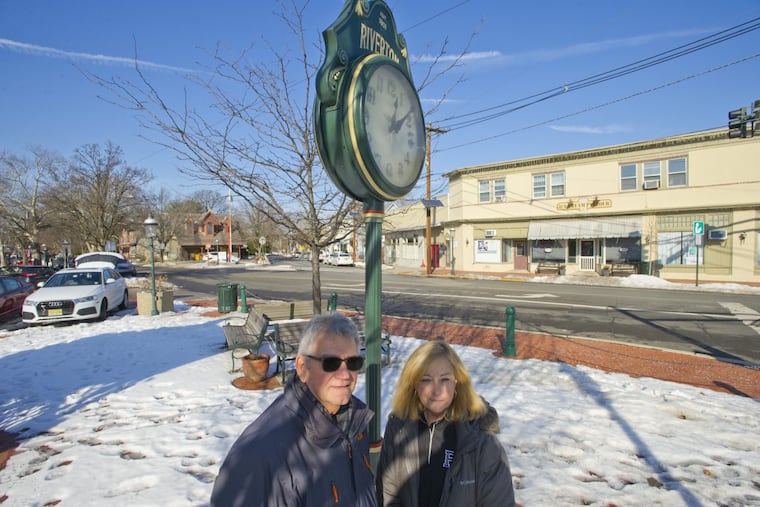Like other dry South Jersey towns, Riverton hopes to refresh businesses with brew
Riverton, NJ is a lovely little town overlooking a scenic stretch of the Delaware River. But borough boosters hope attracting a brewery will brighten the picture for restaurants and other businesses.

With a gracious grid of streets and grand yet neighborly homes, Riverton owes much of its charm to the past.
But like other historically dry towns in South Jersey, Riverton also can see the future in a glass or two of craft brew.
The picturesque Burlington County borough along the Delaware River recently amended its zoning code to accommodate a state-licensed brewery like those that have opened in Collingswood, Haddonfield, Pitman, and elsewhere.
Although no such enterprise has been formally proposed, the welcome mat is out in Riverton, where 2,700 people live in just under a square mile and all the kids in town can walk to the single elementary school.
"A successful brewery [will help] the other businesses and bring people to the town who will see the quaint other things we have here," says Mayor Suzanne Cairns Wells, who has lived in Riverton for half a century and notes that some folks call the place "Mayberry."
Says Borough Councilman Armand "Butch" Bianchini: "A brewery is not a bar, it's not a pool room, it's not people shooting darts. It's people who are connoisseurs of beer coming here."
Buying a cold one has long been impossible in Riverton and other South Jersey communities where sales of alcoholic beverages are forbidden by custom, local restrictions, or because voters either have rejected or not considered having the town offer liquor licenses.
And while a state-issued brewery license is not a liquor license, the number of Garden State communities where alcoholic beverages of any sort can neither be served nor consumed in commercial establishments is dwindling.
In 2007, the number of dry towns statewide was 39. The most current list compiled by the New Jersey Licensed Beverage Association, a trade organization, puts the number at 27.
All but four are in South Jersey, where quirky local customs help make a seemingly ordinary part of the world distinctive and arguably more interesting.
The rise of craft beer culture, particularly among younger consumers. as well as the struggle, and nascent revival, of traditional downtowns, are powerful drivers of change.
"Breweries are a great tool in the toolbox of economic development," says Jason Carty of Lumberton, who until recently served as executive director of the Garden State Craft Brewers Guild.
"Economic development, beverage tourism, and jobs go hand in hand in helping small business districts reinvent themselves. People who would never set foot in Merchantville or Pitman are stopping there because of the breweries."
In Collingswood, the dry reputation once was such that residents believed in the urban legend that booze had been forever forbidden by the founders of Knight Park. The park would become private if alcohol was sold in town, or so the story went.
But restaurants inviting patrons to BYOB have made the Camden County borough a dining destination, and Mayor Jim Maley says the new downtown brewery "has added an amenity … without any detriment."
In Pitman, a Gloucester County community that developed around a Methodist camp meeting more than a century ago, voters in 2016 approved the issuance of up to three liquor licenses. The borough expects to take bids sometime this year.
"The vote was 2-1 in favor, the reverse of what it had been in 2007," Mayor Russ Johnson says.
"The change happened slowly, starting with [restaurant sales of local wines], and then came the breweries," he says. "People got used to alcohol being sold in our town. And I think the demographics have changed."
Ocean City, meanwhile, remains a proud outlier.
"We did have a public ballot initiative in 2012 to allow BYOBs, and it was rejected by a 2-1 margin," says city spokesman Doug Bergen.
"Our motto is `America's greatest family resort,' " Bergen notes. "By and large, residents and visitors don't want to see that change."
Visiting Riverton one sunny afternoon last week, I meet Wells and Bianchini in the cottagelike borough hall on Howard Street. It's less than a block from the borough's commercial heart at Broad and Main Streets, where RiverLine trains stop.
A tiny shopping center on South Broad Street, where successive restaurants have struggled to attract customers, was added to the zoning amendment as the second business district in town where a brewery could be allowed, Wells says.
She takes pains to emphasize that any such business would be a limited operation and would sell neither food nor alcoholic beverages other than beer brewed on the premises. Local restaurants could deliver food to the brewery, however.
"I think it's a great idea," says Janet Williams from behind the counter at the Orange Blossom bakery and cafe, which she accurately describes as a "local hub and gathering place" in Riverton.
"Anything that brings people into the town is wonderful."
Riverton seems to be taking the prospect in stride.
"I'm a bit of a traditionalist," Wells says.
Noting that only two residents spoke out against the Borough Council's decision at the December meeting, the mayor adds: "My initial reaction was, 'Ooh … a brew in Riverton?' But as I learned more about it, I came to embrace the idea."
Although neither a drinking nor a betting man, I think Riverton will as well.